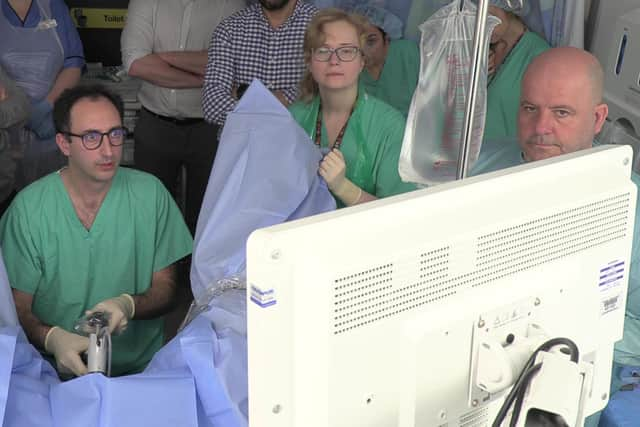Fife pioneers treatment for enlarged prostate without general anaesthetic
and live on Freeview channel 276
The use of local anaesthetic also means the procedure can be carried out as an outpatient appointment within the prostate treatment centre at Queen Margaret Hospital in Dunfermline, freeing up valuable operating theatre time for use by other surgical specialities.
The board became the first in Scotland to begin using a procedure called Rezum in the treatment of patients with benign prostatic hyperplasia (BPH) when it was first introduced in Fife in 2020.
Advertisement
Hide AdAdvertisement
Hide AdThe procedure sees small jets of steam injected directly into the prostate to destroy excess tissue. This causes the prostate to shrink over a period of a few weeks and helps relieve the often debilitating symptoms associated with an enlarged prostate. Unlike more traditional surgical procedures for BPH, Rezum takes less than 20 minutes and patients are able to return home shortly after.


The treatment is now being safely performed under local anaesthetic in Fife, which helps improve patient safety.
Mr Feras Al Jaafari, consultant urological surgeon, leads the Rezum programme in the region. He said: “An enlarged prostate is a common problem experienced by men over 50. It can have a real impact on a person’s quality of life by affecting bladder function, disrupting sleep patterns and increasing the likelihood of urinary tract infections.
“Having the ability to carry out the procedure under local anaesthetic takes us a step-further in our treatment. This development is better for patients as it helps reduce the risks associated with general anaesthetic and enables patients to recover more quickly. It also helps us to free-up valuable theatre time at a time when waiting lists for surgery are much longer following the COVID pandemic.”
Advertisement
Hide AdAdvertisement
Hide AdDr Christopher McKenna, NHS Fife medical director, welcomed the latest innovation pioneered by the urology service, adding: “It is vitally important that we continue to innovate and adapt our services to meet the needs of our population. The unique setup at Queen Margaret, and our investment in day surgery services there, means that the hospital is at the forefront of these efforts. Indeed, this latest innovation is another example of where our highly skilled and forward-thinking clinical teams are utilising technology to help improve the quality of services we can provide for patients in Fife.”
The treatment has also been welcomed by patients:
Ian McIntosh was finding the symptoms of BPH more and more difficult to manage, to the extent he was getting up four or five times a night to use the toilet - he couldn’t even go for a decent walk before he had to stop somewhere.
He said: “I was nervous obviously before the procedure, but I was also looking forward to the prospect of getting something done. It felt like it took five minutes, and although it took a month or so for things to settle, since then things have been great. I regularly don’t get up at all overnight now, and I can get around the whole golf course without having to nip back to the toilet. The difference it’s made has been fantastic.”